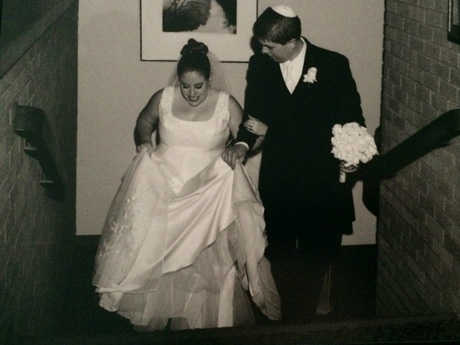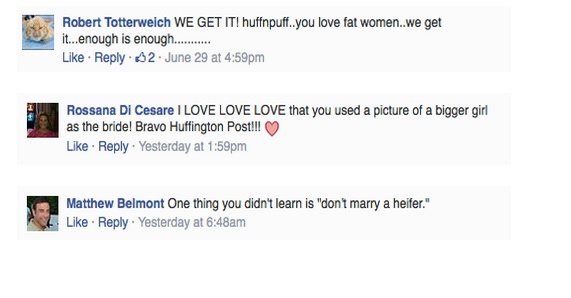今年六月是我跟我老公的結婚12周年。我們的婚姻除了我總是想太多與他總是太忙之外,一切都算很好。所以,身為一個作家我寫了一篇文章叫做”快樂已婚女知道的12個秘密”。
我其實對我自己目前狀況覺得很滿意。我跑步、做些舉重、也吃得算健康。 夏天的陽光讓我也很舒服、在身邊的家人彼此相處狀況也很不錯、不需要追者時間跑等,這一切的一切都讓我可以展現我柔軟的一面,也因為這樣我跳脫了自己的舒適圈、不再渾身是刺。
上星期我跟個朋友相約吃飯,我們邊吃蝦邊喝啤酒、聊者我們的小孩與寫作的一些事情。她好笑的說”我從來都沒有看過你任何照片看起來是很坦率的”。 我整個人聽了緊張了起來。她接著說”我不是在批評你,但我發現你的照片都有特別挑過”
她說的完全正確,身為我的好朋友,她說得一點都不會讓我不舒服。
我的確是會挑過這些照片。我總是會重新拍攝我的自拍照、朋友在FB上標示我我也會拿掉、我照片中每個人的位置都是有安排過的,而且我很少會是照片中站在前面的那個人。當你不喜歡自己胖胖的樣子,那麼你照片就會特別挑過。然而這個夏天,我人變得和善許多。當我寫這篇有關婚姻的文章時,我放了一張我重來沒有在網路上分享的婚紗照。
過去我從來沒有分享過這張照片,因為我並不滿意這張照片中我的體型。我有雙下巴、我腰很粗、我手臂也很粗。但我放入這張照片,因為這張照片中,我看到我們有多快樂、多麼相愛。也就因為這樣,我並沒有多想,在文章中分享了這張照片。
在這場女人對抗自己體態認知的戰爭中,我獲勝了!

當我的這篇PO文越來越多人讀的時候,我開始看看大家的回應是什麼。其實我根本就不應該這麼做。但我當時實在太好奇(太天真)了。我覺得我可以接受任何種評論,也不會改變我對婚姻的想法。事實也的確如此;然而我無法接受的卻是:
這些評論者對我身體外貌的評價。
下面是我截圖下來的評論,或是說是我一再反覆去看的評論。

Robert Totterweich: HUFFPOST 我知道你們有多愛胖女人了好嗎?夠了
Rossana Di Cesare: 我實在太愛Huffington Post用一個胖女生當作新娘的照片了。
Matthew Belmont: 看來你沒有學到"不要跟一隻母牛結婚”
我看著這些評論,數著有多少按讚人數、也看著有多少人評價說不值得喜歡這樣一篇文章。看著這些殘忍、一點都不必要、而著重於肥胖這件事的評論。在電腦螢幕的保護背後,為了我的文章或是為了我的體型,我正在算著有多少人是著重於我的體型、又有多少人真正專注於我的文章內容。
我根本無法不去看那些評論。我老公要我不要再看了。但他說什麼或做什麼都無法讓這些殘忍的評論變得好些,也無法讓我再回到那柔軟的我。我不斷地看者這些持續增加的評論,就像是想知道這火會持續燃燒還是會自己熄滅掉。
心情好些的日子裡,我研究起網路評論、厭女症(misogyny)、或是身體形象等議題。心情再好些,我嘗試繼續寫作。但在那些心情不好的日子(佔絕大多數)裡,我只能哭。
我因為那些在我腦裡盤旋的字眼而哭泣:肥胖、醜陋、母牛。每當我看到鏡子裡的自己,我轉開我的眼睛不願面對。我邊哭邊想知道我老公看到這些評論時,他的想法會是什麼。我邊哭邊想到當我女兒看到這些評論她媽媽的言詞時,她又會是怎麼想、甚至是怎麼看她自己。
我體認到自己有了下面的想法,讓我哭得更嚴重—
我想要再PO些現在的我的照片。讓人們看看我看起來"更好了"。不像過往一樣胖了! 我的自我價值忽然被別人綁架了。我相信了這些評論所說的:胖就是不好、評論別人的身體外觀是正常的。
社會上對於女性體型的注意始終都被視為必要的、而且是可以去評論的。講得好聽些,這是錯誤的!講得直白點,這其實是非常傷害人的。
有時候我的確覺得是可以去評論(不論好壞)一個女性的體型。然而身為一個母親、身為一個女人,我認為我們都不應該再去做任何的評論。
有人說我們會變成我們怎麼說話就會變成怎麼樣的人。以我的經驗來看,我非常認同。即使很多時候你希望你可以收回你講的話,但你永遠不可能收回。我無法告訴你每個女人是怎麼看待這種類似體型討論的對話。但我可以告訴你不要加入討論有關挑剔自己身型的話題將會帶給女人更多心靈上的空間。
JL碎念:
這篇文章告訴我們兩件事情:
1. 不要以為你在螢幕後面的留言就不用負責任你是會傷到別人的。我其實不懂為什麼很多人在網路上就變得很尖酸刻薄,難道他們覺得別人看到都沒感覺嗎? 就不用為自己所言所行負責任嗎?
2. 真的女孩們 不要再一直追求身體的"完美"了。永遠永遠別人都會有人評論 你太瘦了 你太胖了 你腿太短了 你胸部太大了 你屁股太多肉了 ....SO WHAT?
只有你自己滿意自己 你才不用活在這假象的世界裡。
原文在這裡:http://goo.gl/pra4Ji
My husband and I celebrated our 12th anniversary this June. We’ve had a good run despite my over-thinking and his over-scheduling, so I did what we writers do: I wrote a neat and tidy article titled "12 Secrets Happily Married Women Know."
I was feeling especially comfortable in my skin at the time. I’ve been running and lifting and eating (mostly) well, and I’m healthy. The warmth of summer -– the rays that hit me in slices throughout the day, the constant comfort of my family around me, the looseness that comes with a lack of a schedule -- all wore me down, softened my edges, sent me out of my comfort zone and for one teeny tiny moment, I set aside my deeply ingrained defense mechanisms.
I had met a friend for lunch the week before. She faced me across fresh shrimp and cold beer and we talked about our children and our writing, the threads that hold us together. “I never see candid photos of you,” she mused. The hair on my arms, my shoulders, and the back of my neck stood on end. “I’m not judging,” she added, “But I noticed that you like to have control over that.”
She was absolutely right in the non-annoying way that only heart-deep friends can be.
But this summer, I was softened. And when I wrote my article, I included wedding photos that I had never shared online before.
I used to hide them because of the way parts of my body looked in them. My chin (double), my waist (wide), my arms (thick). But I included them because, without my armor, I could see what had always been there –- my husband and I look so happy in them. Joyful, really, and truly in love. And that’s what my article was about, so I embedded the photos, sent my article into my editor, and really and truly didn’t think about them again.
In the body image wars that women, that I, have with ourselves -– this was a win.
When my article got some traction, I decided to take a peek at the comments it was getting. This is a cardinal rule never-ever meant to be broken. But I was curious and I (quite naively) thought, Bring it. I could take whatever commenters could possibly dish about my thoughts on marriage. And this is still true. What I couldn’t take, however, is what commenters –- people, human beings -– said about my body.
Here are a few screen shots I captured that day, or one of the days after that I went back and looked again (and again).
I peered at comments like these through splayed fingers, counted how many “Likes” these got as opposed to how many readers told these people to stop being like “that” –- whatever “that” might be. Cruel, unnecessary, fat-focused. Behind the safety of my screen, I was keeping score –- for my article or against my body. Because these are the two camps that the commenters joined.
I couldn’t stop looking. “Cut it out,” my husband said, shaking his head, desperate to help. But what could he possibly do or say to soften this, or to soften me again?
I kept going back to check on it –- like a tended fire that I needed to know if it would be smothered or fanned.
On good days, I started dialogue about internet comments, misogyny, and body image. On better days I began writing this article. But on hard days, which was most of them, I cried.
I cried for the words flashing through my mind –- Fat. Ugly. Heifer. -- and I cried for the way that I averted my eyes whenever I passed a mirror. I cried trying to figure out what my husband thought reading, seeing, feeling those words and how they would make him read, see, and feel about me. I cried for my daughters seeing those words said about their mom or ever hearing them, or even worse thinking them, about themselves.
And I cried for the desire that I had to show photos of myself today –- Look! I’m “better” now! Not perfect, but not as fat as that! My self worth suddenly became entrenched in those words. I was tethered. I was also perpetuating the exact same thing those commenters were -– fat is bad, body commenting is normal, and valid. I cried a lot about that.
There are very few times that I think it’s okay to comment on a woman’s body -– in a complimentary or in a negative way. As a mother and as a woman, I think we all need to stop that conversation, to consider it taboo.
People say that the way we’re spoken to becomes our self-talk. In my experience this is very true. And as much as we’re loved, it’s incredibly difficult to undo this.
I can’t tell you how body talk makes every woman feel, but I can tell you that staying away from body compliments and body bashing, body noticing and body commentary leaves room for the kinds of words that we want the women –- and the girls -- in our lives to hear, to repeat, to have written to them by the typewriters in their own minds. And that, can’t hurt.


